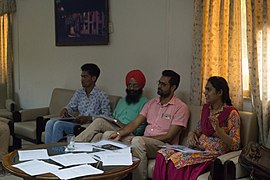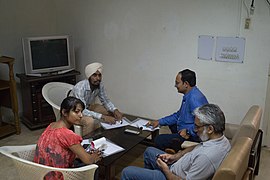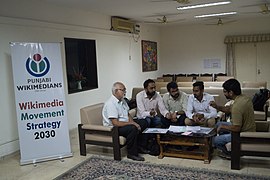Strategy/Wikimedia movement/2017/Sources/Cycle 3/Punjabi Wikimedians Strategy Meetup in Patiala (15 July 2017)
Information[edit]
What group or community is this source coming from?

| name of group | Punjabi Wikimedians |
| virtual location (page-link) or physical location (city/state/country) | Patiala, Punjab, India |
| Location type (e.g. local wiki, Facebook, in-person discussion, telephone conference) | in-person discussion |
| # of participants in this discussion (a rough count) | 24 |
Summary[edit]
The summary is a group of summary sentences and associated keywords that describe the relevant topic(s). Here is an example.
| Line | Week # | Key insight | Summary Statement | Overall | Keyword |
|---|---|---|---|---|---|
| 1 | 1 | A | Example: Knowledge needs to be more relevant. We need much easier ways to add images and videos. Many people want more diverse content, and we need ways to make these easy to crowd-source. We need new projects devoted to this effort that work well. | supportive | example |
| 2 | 1 | A | Example: If we start doing things other than long-form, cited articles, we will dilute the integrity of the projects. | concern | example |
| 3 | example | example | example table only | neutral | example |
Taken together, all the summary sentences should provide an accurate summary of what was discussed with the specific community.
Fill in the table below, using these 2 keys.
- Key Insight
- The Western encyclopedia model is not serving the evolving needs of people who want to learn.
- Knowledge sharing has become highly social across the globe.
- Much of the world's knowledge is yet to be documented on our sites and it requires new ways to integrate and verify sources.
- The discovery and sharing of trusted information have historically continued to evolve.
- Trends in misinformation are increasing and may challenge the ability for Wikimedians to find trustworthy sources of knowledge.
- Mobile will continue to grow. Products will evolve and use new technologies such as artificial intelligence, augmented reality, and virtual reality. These will change how we create, present, and distribute knowledge.
- As the world population undergoes major shifts, the Wikimedia movement has an opportunity to help improve the knowledge available in more places and to more people.
- Readers in seven of our most active countries have little understanding of how Wikipedia works, is structured, is funded, and how content is created.
- Overall (either)
- supportive
- concern
- neutral
| Line | Week # | Key insight | Summary Statement | Overall | Keyword |
|---|---|---|---|---|---|
| 1 | 2 | C | Subject experts such as scholars, academics, journalists should be approached and they should be involved in the movement. Their expertise will be helpful to create, improve, or validate quality content. | supportive | experts |
| 2 | 2 | C | Very important undocumented cultural and other content can be documented by various mediums such as photography, documentaries etc. | supportive | other mediums |
| 3 | 2 | C | Videos can be created to be used as citations. | supportive | video citations |
| 4 | 2 | C | There should be focus on production of knowledge in regional languages. | supportive | regional languages |
| 5 | 3 | E | Ideological propagation and advocacy should be restricted in a systematic way. The larger community should be made aware of point of view pushing, and neutral point of view. | supportive | POV |
| 6 | 3 | E | As of now machine translation is way far from perfect, and the translation can often be misleading. | supportive | machine translation |
| 7 | 3 | E | Artificial intelligence such as bots can be used to scan content, particular words or phrases (such as the way Cluebot works) | supportive | AI |
| 8 | 2 | C | As we have very little content in Punjabi, attempts need to be made to create content in regional languages. | supportive | regional languages |
| 9 | 2 | C | Knowledge in other languages can be used for referencing and other purposes with the help of translations wherever possible and applicable. | supportive | knowledge in other languages |
| 10 | 2 | C | There are inconsistencies in regional languages terminology. Attempts should be made to bring consistencies in such usage. Academics and notable publications may be approached for help. | neutral | consistency in terminologies |
| 11 | 3 | E | Some articles such as recent events are sometimes affected by non-constructive edits. Different levels of protections and other administrative actions may be used to try to avoid such issues. | supportive | different levels of protections |
| 12 | 2 | C | Written and audio-visual content should be created on different topics. | supportive | text and multimedia |
| 13 | 2 | C | Access to libraries, journals and books in regional languages will help in verifying information. | supportive | content in regional languages |
| 14 | 2 | C | Already documented but difficult to access traditional and oral knowledge should be used. | supportive | using documented knowledge |
| 15 | 2 | C | Documentation and verification of traditional and oral knowledge should be done. Verification can be done by including names of the people from whom the information has been gathered. | supportive | documentations |
| 16 | 3 | E | Combat misinformation with the help and guidance of experts, reviewers and newcomers. | supportive | experts, reviewers and newcomers |
| 17 | 2 | C | GLAM projects can be conducted to document or digitize undocumented knowledge in different medium such as text, images, audio etc. | supportive | GLAM |
| 18 | 2 | C | Multiple versions of an item can be used. | supportive | Multiple versions |
| 19 | 2 | C | Subject experts should be consulted for improving content and validating information. | supportive | Experts |
| 20 | 2 | C | There is a tendency in some Indic Wikis to use mostly text sourced. | neutral | text sources are used more |
| 21 | 2 | C | More focus should be given to use audio-visual sources. | supportive | audio-visual sources |
| 22 | 2 | C | There should not be any binary division while using or documenting oral and traditional knowledge. | supportive | binary division |
| 23 | 3 | E | Experts should be consulted to validate information. | supportive | experts |
| 24 | 3 | E | Different aspects and point of views should be balanced and neutrality should be maintained. | supportive | POVs |
| 25 | 3 | E | Locating multiple sources to validate information and combat misinformation. | supportive | multiple sources |
| 26 | 3 | E | More stress should be given on information verification. | supportive | verification |
| 27 | 3 | E | Alerts and notifications should be used to notify misinformation combat task force, and also to notify/warn non-constructive editors. | supportive | alerts and notifications |
| 28 | 1 | A | Interface should be made more friendly (such as the Visual Editor) for newcomers and beginners. Internet is becoming more and more available these days. Any initiative to make Wikimedia projects more available and cost-effective will be helpful to bring new readers and editors. | supportive | Internet availability |
| 29 | 1 | A | More focus should be given to improve content in regional language Wikiprojects. | supportive | regional languages |
| 30 | 1 | A | Create multimedia content in different languages. | supportive | multilingual multimedia |
| 31 | 1 | A | Easy navigation and accessibility can be introduced/improved. | supportive | navigation and accessibility |
| 32 | 3 | E | To verify information, experts should be consulted, and attempts should be made that this verification is done quickly, as misinformation and rumor spread very fast. | supportive | experts |
| 33 | 3 | E | Sometimes news can spread misinformation very quickly, so proper verification and consultation of multiple news sources should be done before including the information. | supportive | multiple sources |
| 34 | 3 | E | Only neutral information should be included without being biased towards any particular propaganda, and point of view. | supportive | neutral information |
| 35 | 3 | E | Identification and removal of misguided topics and wrong information should be done in a systematic and timely manner. | supportive | removal of misinformation |
| 36 | |||||
| 37 | |||||
| 38 | |||||
| 39 | |||||
| 40 |
If you need more lines, you can copy them from Strategy/Wikimedia movement/2017/Sources/Lines.
Detailed notes (Optional)[edit]
If you have detailed notes in addition to the summary, you may add them here. For example, the notes may come from an in-person discussion or workshop. If your discussion happened on a wiki or other online space, you do not need to copy the detailed notes here.
Strategy Salon Coordinators:
- Tanveer Hasan (Centre for Internet and Society)
- Tito Dutta (Centre for Internet and Society)
- Stalinjeet Brar
- Satdeep Gill
Organizers:
Challenges of the strategy meeting
Challenge 1: How do our communities and content stay relevant in a changing world?
Challenge 2: How could we capture the sum of all knowledge when much of it cannot be verified in traditional ways?
Challenge 3: As Wikimedia looks toward 2030, how can we counteract the increasing levels of misinformation?
Group 1[edit]
Participants:
- Dr. Rajwinder Singh, Assistant Professor, Punjabi University, Patiala
- Navinder Pandher, Research Scholar, Punjabi University, Patiala
- Jagvir Kaur, Wikipedian
- Satpal Dandiwal, Wikipedian
- Er. Charanjiv Singh Saroa, Assistant Professor, Punjabi University, Patiala

Challenges taken: Second challenge and Third Challenge
Second challenge:[edit]
- Subject experts such as scholars, academics, journalists should be approached and they should be involved in the movement. Their expertise will be helpful to create, improve, or validate quality content.
- Very important undocumented cultural and other content can be documented by various mediums such as photography, documentaries etc.
- Videos can be created to be used as citations
- There should be focus on production of knowledge in regional languages
Third challenge:[edit]
- Ideological propagation and advocacy should be restricted in a systematic way. The larger community should be made aware of point of view pushing, and neutral point of view.
- As of now machine translation is way far from perfect, and the translation can often be misleading.
- Artificial intelligence such as bots can be used to scan content, particular words or phrases (such as the way Cluebot works)
Group 2[edit]

Participants:
- Dr. Surjit Singh, Professor, Punjabi University, Patiala
- Nitesh Gill, Wikipedian
- Mandeep Kafir, Wikipedian
- Varinder Sharma, Wikipedian
Challenges taken: 1, 2 and 3:
- As we have very little content in Punjabi, attempts need to be made to create content in regional language.
- Knowledge in other languages can be used for referencing and other purposes with the help of translations wherever possible and applicable.
- There are inconsistencies in regional languages terminology. Attempts should be made to bring consistencies in such usage. Academics and notable publications may be approached for help.
- Some articles such as recent events are sometimes affected by non-constructive edits. Different levels of protections and other administrative actions may be used to try to avoid such issues.
- Written and audio-visual content should be created on different topics.
- Access to libraries, journals and books in regional languages will help in verifying information.
- Already documented but difficult to access traditional and oral knowledge should be used.
- Documentation and verification of traditional and oral knowledge should be done. Verification can be done by including names of the people from whom the information has been gathered.
- Combat misinformation with the help and guidance of experts, reviewers and newcomers.
Group 3[edit]

Participants:
- Dr. Manavpreet Kaur, Wikipedian
- Balram, Punjabi author
- Gaurav Jhammat, Wikipedian
- Nazia Dhanju, Journalist

Challenges taken: Second challenge and Third challenge
Second challenge[edit]
- GLAM projects can be conducted to document or digitize undocumented knowledge in different medium such as text, images, audio etc.
- Multiple versions of an item can be used.
- Subject experts should be consulted for improving content and validating information.
- There is a tendency in some Indic Wikis to use mostly text sourced. More focus should be given to use audio-visual sources.
- There should not be any binary division while using or documenting oral and traditional knowledge.
Third challenge[edit]
Lack of information, biasness, and deliberate propaganda are reason of misinformation spreading, To combat this two types of measures should be taken a) corrective measures, b) combat measures

Corrective measures[edit]
- Experts should be consulted to validate information
- Different aspects and point of views should be balanced and neutrality should be maintained.
Preventive measures[edit]
- Locating multiple sources to validate information and combat misinformation.
- More stress should be given on information verification.
- Alerts and notifications should be used to notify misinformation combat task force, and also to notify/warn non-constructive editors.
Group 4[edit]
Participants:
- Charan Gill, Wikipedian
- Harpreet Sandhu, Wikipedian
- Manjeet Singh, Wikipedian
- Gurlal Maan, Wikipedian
- Param munde, Wikipedian

Challenges taken: 2nd and 3rd
First challenge[edit]
- Interface should be made more friendly (such as the Visual Editor) for newcomers and beginners. Internet is becoming more and more available these days. Any initiative to make Wikimedia projects more available and cost-effective will be helpful to bring new readers and editors.
- More focus should be given to improve content in regional language Wikiprojects
- Create multimedia content in different languages.
- Easy navigation and accessibility can be introduced/improved.
Third challenge[edit]
- To verify information, experts should be consulted, and attempts should be made that this verification is done quickly, as misinformation and rumor spread very fast.
- Sometimes news can spread misinformation very quickly, so proper verification and consultation of multiple news sources should be done before including the information.
- Only neutral information should be included without being biased towards any particular propaganda, and point of view.
- Identification and removal of misguided topics and wrong information should be done in a systematic and timely manner.




